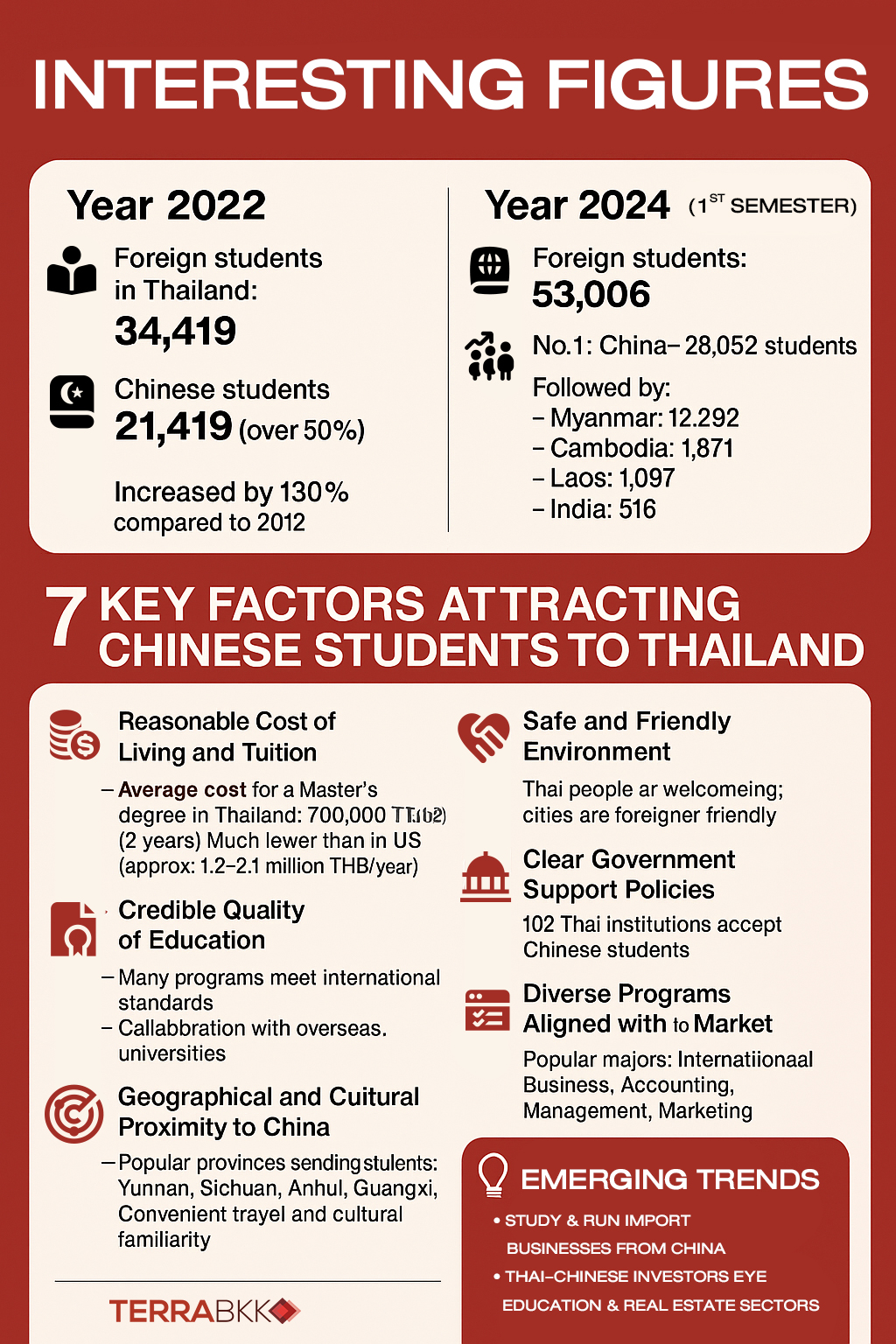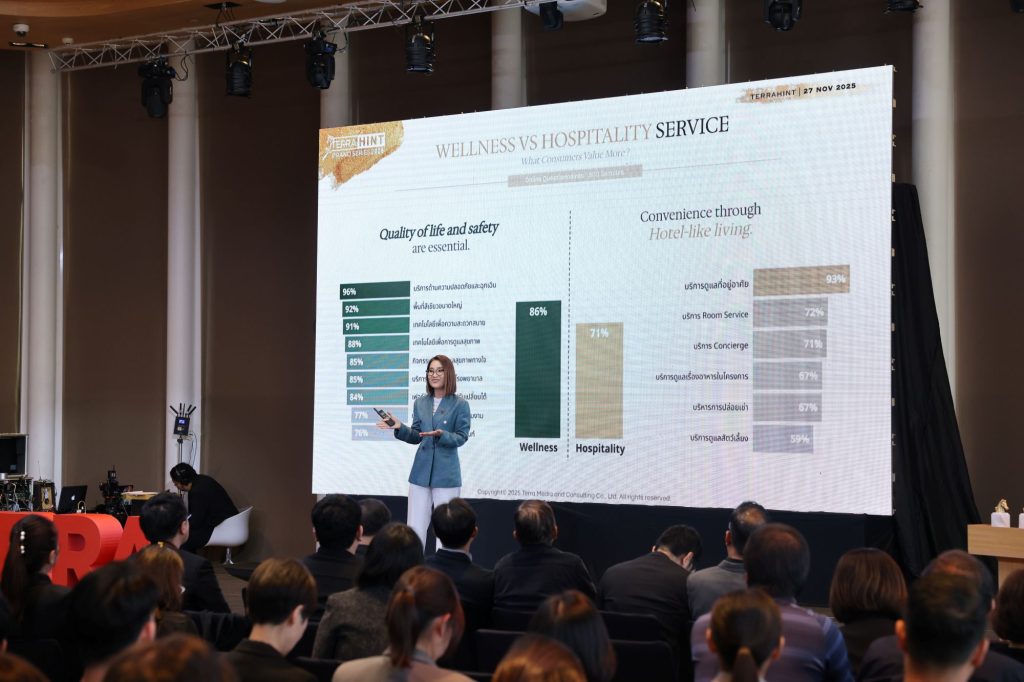NEWS & EVENTS

In recent years, “Thailand” has become an increasingly popular destination for international students, especially students from China. This trend didn’t happen coincidentally, but stemmed from several positive factors that helped attract a large number of International families and individuals to pursue their education at various academic institutions across Thailand.
A Popular Trend Not by Chance
Over the past decade, academic institutions in Thailand have been increasingly popular among international students, especially students from China. Even though the trend was a slowdown during the COVID-19 pandemic, the popularity regained its pace again after the situation subsided.
The main factors that contribute to the popularity of academic institutions in Thailand stem from the ongoing dynamic across the globe, including economic slowdown, political turmoil, and rising education costs in Western countries. These situations encouraged the Chinese parents to eye toward countries in Southeast Asia as a destination to further the education of their children. Thailand, in particular, has seen a significant growth in the number of students from China.

Since 2019, more than 90,000 Chinese students have enrolled in academic institutions across Southeast Asia. The majority are in Singapore, Thailand, Indonesia, and Vietnam. Notably, Thailand ranks among the top 10 popular countries for the Chinese families to send their children to study abroad.
According to data from the Ministry of Higher Education, Science, Research and Innovation, in the academic year 2022, there were a total of 34,202 international students. More than half were Chinese (21,419 students). This represents a 130% increase from 9,329 Chinese students in the academic year 2012. This rise is attributed to an open education system, lower tuition fees, uncomplicated visa procedures, and a relatively relaxed lifestyle in Thailand.
By the first semester of the academic year 2024, the total number of international students in higher education had risen to 53,006, a significant increase from the year 2022. It’s evident that over the past 2-3 years, the number of Chinese students in Thai universities has significantly increased. As for the number of international students in Thailand, China ranks first with 28,052 students, followed by Myanmar with 12,292 students, Cambodia with 1,871 students, and Laos with 1,097 students. Followed by students from Vietnam, Indonesia, the Philippines, and India.

Uncover the Popularity of Studying in Thailand Among Chinese Students
The key driving forces for Chinese students to pursue education in Thailand stem from several factors, including:
- Reasonable Costs:
Compared to Western countries, or even some major cities in China itself, the cost of living and tuition fees in Thailand are considerably more attainable. This makes studying in Thailand an attractive option for many Chinese families.
Factors that make ASEAN an important choice include reasonable costs. For instance, the average cost of a master’s degree in Thailand is approximately 150,000 yuan, or around 700,000 baht for two years. This is lower than the average cost in the United States, which ranges from 200,000 to 350,000 yuan per year.
- Reputable Quality of Education:
Many universities in Thailand have developed internationally recognized curricula and teaching standards. They have collaborations with foreign educational institutions, and some fields of study are well-known regionally.

3. Geographic and Cultural Proximity
Thailand shares closer geographical and cultural ties with China than countries on other continents. This makes adapting and living in Thailand easier for Chinese students. It’s observed that most Chinese students studying in Thailand come from the southern Chinese provinces of Yunnan, Sichuan, Anhui, and Guangxi, followed by Shandong, Guangdong, and Beijing, all of which are not far from Thailand and are convenient for travel.
4. Opportunities to Learn a Third Language
In addition to learning through English-language programs, Chinese students also have the opportunity to learn Thai, or other languages that important to the region, which can increase their future employment prospects
5. Friendly and Safe Environment
Thailand is renowned for the hospitality of its people and is a relatively safe country for international students.
6. Policies Promoting Education for Foreigners
The Thai government and many educational institutions have policies and projects supporting international students. Academic institutions across Thailand have increasingly opened their doors to foreign students. With over 100 institutions nationwide, over 50 of which are in Bangkok and its vicinity.
7. Diverse Course Offerings
Thai higher education institutions offer a wide variety of courses across different fields, catering to the diverse interests of students. It’s found that Chinese students are interested and passionate in studying at all levels, from bachelor’s to doctoral degrees. Bachelor’s degrees are the most popular.

Popular courses among Chinese students include Business Administration with specializations in commerce, management, international business, marketing, and accounting.
Additionally, some students have open businesses such as importing goods from China to Thailand. While they do purchase Thai products, they often prefer and are accustomed to using Chinese goods, which are more readily available in Chinese supermarkets.
Given these positive factors, it’s not surprising that both Thai and Chinese investors are developing educational systems to accommodate Chinese students. This includes investing in and acquiring educational institutions, as well as investing in related businesses such as residential real estate and retail stores, to support the growing number of Chinese students in Thailand.




